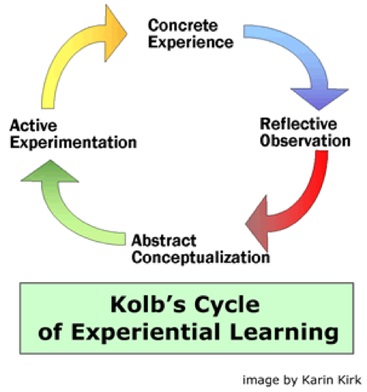Experiential learningAt the heart of all that we do, from our volunteering programmes, to enterprise training and our educational courses is ‘experiential learning,’ the idea that we best learn through ‘doing’ and that by helping people to learn through experience we empower them to not only learn for themselves but to develop as individuals, to become wiser!
"Tell me and I will forget, 
David Kolb: Experiential Learning: Experience as the Source of Learning and Development 1984
outlines ideas on Experiential Learning that have formed the bedrock of work experience modules in education in the UK forming, as it does, a compelling model of how we learn. His book is far more than the ideas currently adopted in FE Colleges around the country. Kolb grounds his book with a thorough overview of the subject through the global lenses of philosophy, psychology and religion. His ideas spring from millennia of experience through diverse cultures, times and thinking. The book argues not only that we learn through experience, or rather by reflecting on experience to formulate more efficient strategies to improve on any experience that we have, but that it is a process that leads to personal development, even wisdom. There is a huge amount of literature building on Kolb’s ideas much of which is focused on specific applications - Special Needs, Autism, Dyslexia and Adult Education in particular. Experiential learning can influence the student's motivation, knowledge transfer, creativity, self-confidence and how to create learning opportunities, which can influence development of metacognitive skills, practical and independent work skills, exploratory skills and efficient learning through non-formal activities. The Fair Earth Foundation and the AWdF have always operated on the principles of Experiential Learning and they are embedded in all of our processes. We want to build on Kolb’s model of Experiential Learning by reflecting on our own experience of adopting this approach with the many thousands of young people who have been through our projects from many different backgrounds and cultures over several decades. Our Focus: 1. Lack of self confidence and self-esteem seem clearly the biggest impediments to individual learning and self-development. 2. If individuals are disadvantaged educationally this compounds the difficulty in learning; if they cannot ‘compete’ through language, communication, knowledge, etc it is all but impossible for them to build their self-confidence and self-esteem through formal learning processes. And on the basis that self-confidence/esteem are pre-requisites to learning then other models of learning have to be adopted. 3. Experience has shown us that ‘creative’ activities present opportunities for people who lack a traditional, formal education to complete with those who have benefitted from such experience: filmmaking, photography, graphic design, sports, design, music, art and more. 4. It is possible through developing learning experiences involving activities where ‘creative thinking’ is central to give people who are educationally disadvantaged experiences that enable them to build their self-confidence/esteem. In this process it should be possible to empower such individuals to develop their skills and competences through further learning. 5. Properly managed, effective experiential learning frameworks can propel disadvantaged students beyond their more formally educated peers through greater personal growth and development. This appears to be grounded in such people having a clearer ‘street wise’ grasp of the wider world and, critically, an appreciation of the opportunities and their benefits afforded to them, a quality sadly lacking elsewhere. |